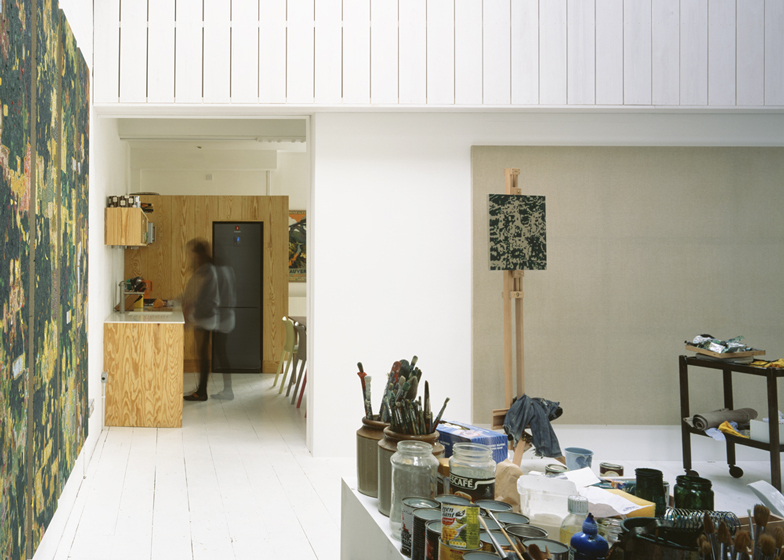London architect Dingle Price has revamped a warehouse in south London to create a bright spacious home and studio for a painter and his family.
Dingle Price began by stripping the interior of the old Victorian warehouse where the artist and his wife had already been living for several years. Making use of an existing mezzanine, the architect divided the space in half to create two-storey living quarters on one side and a double-height studio on the other.
"This idea of subdividing the space into equal parts led to a concept of inserting a house within the studio," Price told Dezeen. "The position of the existing mezzanine decided which half would be which."
North-facing skylights allow daylight to flood the inside of the studio, where high ceilings offer enough room for several large canvases.
Windows puncture the partition wall so residents can look into the studio from their two upstairs bedrooms.
"It's quite an internalised world," said Price. "When you're in there you don't really look out. It's a kind of internal landscape where, instead of looking at a landscape, you're looking across a sequence of spaces."
Walls and ceilings are plastered white throughout and there are a mixture of both painted and exposed pine floorboards.
Other artists' studios to feature on Dezeen include a series of buildings on a Canadian island and a faceted house and studio for an artist in Spain.
Photography is by Ioana Marinescu.
Here's a project description from Dingle Price:
House for a Painter
Attracted by the large volume and excellent natural light, the artist and his wife lived and worked in this warehouse building in an ad hoc manner for some years, before the arrival of their first child necessitated a more formal inhabitation.
Dingle Price Architects proposed the insertion of a two storey house with a front facade overlooking and animating the studio space which attains the character of a small piazza or garden, a feeling further enhanced by the large landscape paintings in progress.
The design draws on the symmetrical character of the existing building to provide a series of interconnected rooms of varied scale and proportion. The existing interior consisted principally of white plastered walls, and both unfinished and white painted pine floorboards. Rather than introducing new materials, we chose to adopt and extend the use of this palette - staircase and cabinetry are constructed from southern yellow pine planks, and the elevation of the residence if partially clad in painted pine boards of a matching width to the floorboards.
Whilst the residence can be entirely or partially closed off from the studio when necessary, opening the doors and shutters reveals scenic views across the internal landscape.

